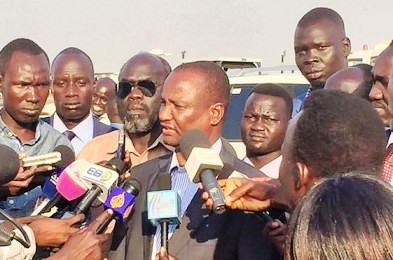South Sudan internal peace dialogue makes no progress
January 31, 2016 (JUBA) – Talks between President Salva Kiir’s government and senior members of the advance team of the armed opposition faction, SPLM-IO, under the leadership of former Vice President, turned opposition leader, Riek Machar, are not making much progress, despite mounting regional and global pressure on the two sides to break deadlock in order to form a transitional government of national unity in compliance with the peace agreement they signed in August 2015 to end 21 months civil war.

Dhieu Mathok Diing, Secretary General of the SPLM-IO and a veteran politician charged with overseeing talks aimed at implementing the peace agreement, told Sudan Tribune on Saturday his group remained fully committed to finding a way to break the deadlock if the president and members of his government accepted implementation of peace agreement the way it was signed based on 10 states.
However, Diing said no progress had been made even though they have had several engagements with top government officials including President Kiir himself whom he said had not indicated readiness to move forward.
He said he was hopeful there would be “light at the end of this situation of darkness.”
Peter Mabior Riiny, deputy head of youth league of SPLM-IO described the beginning of the period after the 38 senior members of his group visited their headquarters in Pagak for consultations with the leadership there and returned to the national capital Juba as” laborious” as it was in the proceeding weeks.
“We are not making much progress. Our colleagues in Juba have not reported any progress and what we are hearing is that the government is unable to move forward with the implementation of the agreement. They (government) are proposing inclusion of 28 states in the constitution. They are talking of expanding the advisory team. Our team proposes five (5),” said Riiny.
The armed opposition leader stressed that the issue of advisors was not a big deal, but the issue of 28 states because the agreement was signed on the basis of 10 states and if there is a need to increase the number then this would be done with participation of the citizens as this is not the issue the two parties can decide before peace agreement is implemented.
A presidential aide confirmed separately that President Kiir had convened meetings with senior members of armed opposition without successful story to share with the public after the meeting. The official described the failed dialogue as “lost efforts”, with officials from both sides confirming “no progress” had been made.
“The SPLM-IO members are frustrating efforts of the president each time they are called for meeting with him because members of the international community are pressing him to talk with them but these people are intransigent. They are reciprocating anything. They are squandering the opportunity and people are dying. They have no country in their hearts. They don’t care about the suffering of our people. They only care about their positions and what Riek Machar and their foreign friends tell them,” claimed a presidential aide who has been involved in arranging several meetings between the president and members of the opposition, including members of former detainees in Juba.
Gordon Buay, one of the diplomats promoted to grade 2 as senior Ambassador by Kiir’s presidential decree at the ministry of foreign affairs and deployed to its mission at the United States, said opposition group was making impossible demand.
Echoing views held by most government officials, particularly those who see themselves close or wanting to be close to the president, Buay said “the decision creating more states will never be revoked even if heaven and earth come to an end than cancelling the presidential order.”
“It has to be made clear that the cancellation of 28 states as Riek Machar wishes will never happen. It is better for heaven and earth to end than for the Establishment Order to be revoked,” said Buay on Saturday.
In an attempt to address the main questions confronting the rival sides, President Kiir’s deputy in government and party, James Wani Igga, proposed that they discuss ending the violence and the formation of a transitional government while leaving behind contentious matters to be addressed later.
“The priority of our people now is peace and the current issue now is to arrest this situation and then we can discuss these other things later when there is peace, when our markets are working and when the economic situation has improved. This is what we tell the advance team of members of Riek and the members of the international community who by the way are seeing the importance of these points,” said Igga in a statement to the state owned South Sudan Television (SSTV) on Friday.
Igga however fell short to clarify what he meant to leave behind the issue of 28 states, whether to allow them to operate or to suspend them until another agreement is reached on how many states the country should have.
The East African regional body, IGAD, which mediated the peace agreement, has released a statement on Sunday, calling on President Kiir to “suspend” the 28 states, describing the decision for creating them as “inconsistent” with the peace agreement.
Besides, the two parties have not yet implemented the security arrangements as required before forming a transitional government, with IGAD also calling on the two groups to deploy their joint troops in Juba in the first week of February before the government is formed.
However, senior political and military leaders, including the chief of general staff, Paul Malong Awan, reject implementation of the security arrangements in fear of war resuming inside Juba, throwing doubts whether the government will withdraw its excess forces from the capital and allow 3,000 opposition troops to enter Juba as per the deal.
(ST)
